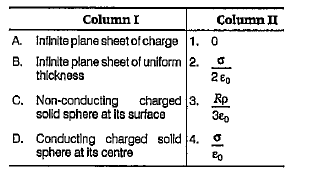Select the correct statement :(Only force on a particle is due to electric field)
A charged particle always moves along the electric line of force.
A charged particle may move along the line of force
A charge particle never moves along the line of force
A charged particle moves along the line of force only if released from rest
The correct Answer is:B
Step by step video, text & image solution for Select the correct statement :(Only force on a particle is due to electric field) by Physics experts to help you in doubts & scoring excellent marks in Class 12 exams.
Updated on:21/07/2023Topper's Solved these Questions
- ELECTROSTATICS - I BOOK - MOTIONCHAPTER - ELECTROSTATICS - I EXERCISE - EXERCISE - 2 (Level -I) (Section B)
8 Videos
- ELECTROSTATICS - I BOOK - MOTIONCHAPTER - ELECTROSTATICS - I EXERCISE - EXERCISE - 2 (Level -I) (Section C)
6 Videos
- ELECTROSTATICS - I BOOK - MOTIONCHAPTER - ELECTROSTATICS - I EXERCISE - EXERCISE - 1 (Section E)
15 Videos
- ELECTROSTATICSBOOK - MOTIONCHAPTER - ELECTROSTATICSEXERCISE - Exercise -3 Section (B) Previous Year Problems | JEE Main
30 Videos
- ELECTROSTATICS-IIBOOK - MOTIONCHAPTER - ELECTROSTATICS-IIEXERCISE - Exercise - 4 (Level - II)
30 Videos
Similar Questions
Knowledge Check
Select the correct statement :(Only force on a particle is due to electric field)
AA charged particle aloways moves along the electric line fo force .BA charge particle never moves along the line of forceCA charged particle mvoes along the line of forceDA charged particle mvoes along the line of force only if released from rest .Select the correct statements for a particle in a state of motion.
AIf speed of the particle changes then velocity of the particle must change and it must have non-zero acceleration.BIf velocity of the particle change then its speed must also change and particle must have non-zero acceleration.CWhen particle moves in a straight line with changing speed then its velocity may remain constant.DWhen velocity of the particle changes then its speed may or not change but particle must have some acceleration.Select the correct statement. For a particle moving on a straight line
AAverage speed is equal to magnitude of average velocityBAverage speed may be greater than magnitude of average velocityCAverage velocity = instantaneous velocity if velocity is constantDMoving with constant acceleration, average velocity for given time interval is arithmetic mean of initial and final velocity
Select the only correct statement from the following :
View SolutionSelect the correct statement about the magnetic field lines :
View SolutionSelect correct statement regarding pseudo force :-
View SolutionAssertion : Electric field produced by a variable magnetic field can't exert a force on a charged particle.
Reason : This electric field is non-conservative in nature.
View SolutionElectric field due to

View Solution
